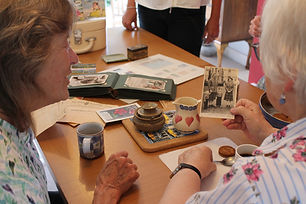
Forget-Me-Not CST


The Heart of the Matter
Why We do CST
Begin to unpick why it's a "no brainer" to engage with CST
Recommended by:
NHS
NHS Institute for innovation:
" CST can save the NHS £54.9 m a year"
"people with mild to moderate dementia should be given the opportunity to take part in a CST programme"
World Alzheimer's report 2012:
recommends that CST SHOULD be provided to people in early stages of dementia.
"CST should be delivered irrespective of any antidementia drug received by the person with dementia"
Our motive
Dementia is difficult to live with and difficult to treat.
Current medications may not provide the level of relief that individuals and their caregivers hope for &, as symptoms progress, they can become increasingly hard to manage.
This makes alternative approaches that emphasise emotional & psychological well-being especially helpful, offering meaningful support & improving quality of life for both individuals & those who care for them.
You will find research papers & reviews on the left hand side of this page detailing why CST should be available to everyone and engaged with in the early stages of the dementia journey.
Who doesn't want the chance to live well for as long as possible?
See our pages detailing our CST delivery or get in tough to discuss how you or your loved one can benefit:

CST - a Magic
Grounded in Science
Cognitive Stimulation Therapy (CST) was first developed in the late 1990s and early 2000s by British researchers and psychologists A. Spector, M. Orrell, and B. Woods. It originated from Spector’s Ph.D. research, which explored effective, non-drug treatments for individuals with mild to moderate dementia. Their work showed that CST led to measurable improvements in brain functions, such as memory, attention, and language skills.
Excitingly, it was just as effective as commonly prescribed medications in addressing cognitive symptoms. Further studies have since confirmed that CST can improve cognitive function, regardless of whether a person is also taking medication.
Caregivers trained in CST techniques often experience better communication and connection with their loved ones. While home-based individual CST (iCST) can enhance caregiver-patient relationships, research suggests it may not offer the same cognitive or quality-of-life benefits as group-based CST - group programs are generally preferred when accessible, though iCST can still be valuable.
CST helps the brain stay active and adaptable, known as neuroplasticity. Through this, it promotes the development of new neural pathways and enhances cognitive functioning by challenging cognitive functions such as attention, memory, problem-solving, and executive functions.
In turn, this leads to delayed cognitive decline, improved confidence, sense of personal value, wellbeing, and keenness to engage socially.
Who doesn't want that?


Unpack boxed up memories
with reminiscence therapy



Our mission in a nutshell:
At Forget Me Not Hub, we believe in the power of staying sharp, staying social, and staying joyful.
Our mission is to empower individuals in the early stages of dementia—or those seeking to prevent it—to live well, think boldly, and stay connected.
Through energising, brain-challenging sessions filled with laughter, creativity, and community, we ignite sparks of confidence, clarity, and joy.
Because living well starts with thinking well—and no one is ever forgotten here.